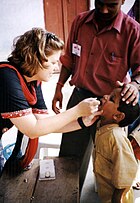Portal:Viruses/Selected miscellany/4
Vaccination or immunisation is the administration of immunogenic material (a vaccine) to stimulate an individual's immune system to develop adaptive immunity to a virus or other pathogen, and so develop protection against an infectious disease. The active agent of a vaccine may be intact but inactivated or weakened forms of the pathogen, or purified highly immunogenic components, such as viral envelope proteins. Smallpox was the first disease for which a vaccine was produced, by Edward Jenner in 1796.
Vaccination is the most effective method of preventing infectious diseases and can also ameliorate the symptoms of infection. When a sufficiently high proportion of a population has been vaccinated, herd immunity results. Widespread immunity due to mass vaccination is largely responsible for the worldwide eradication of smallpox and the elimination of diseases such as polio from much of the world. Since their inception, vaccination efforts have met with objections on scientific, ethical, political, medical safety and religious grounds, and the World Health Organization considers vaccine hesitancy an important threat to global health.

